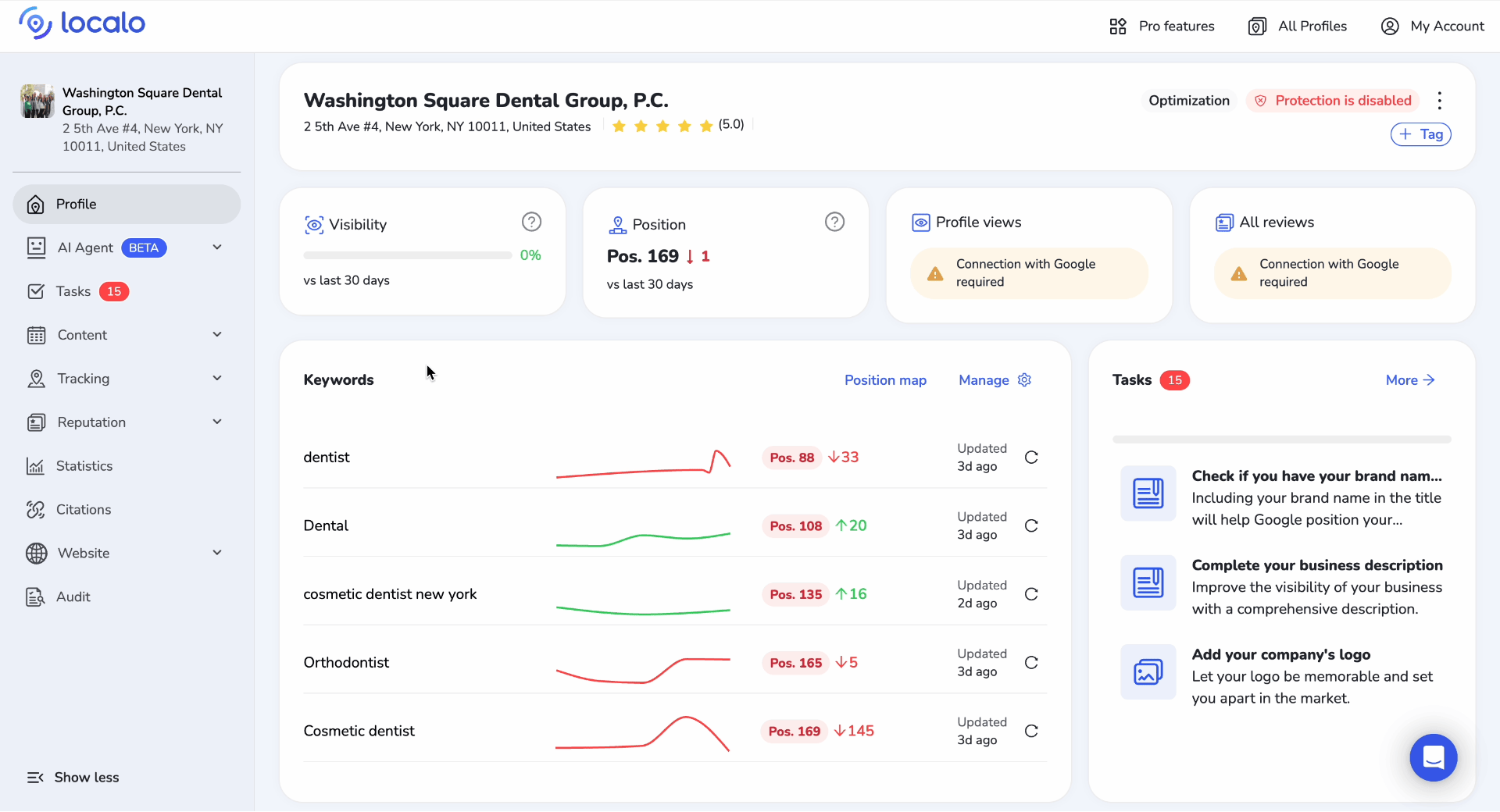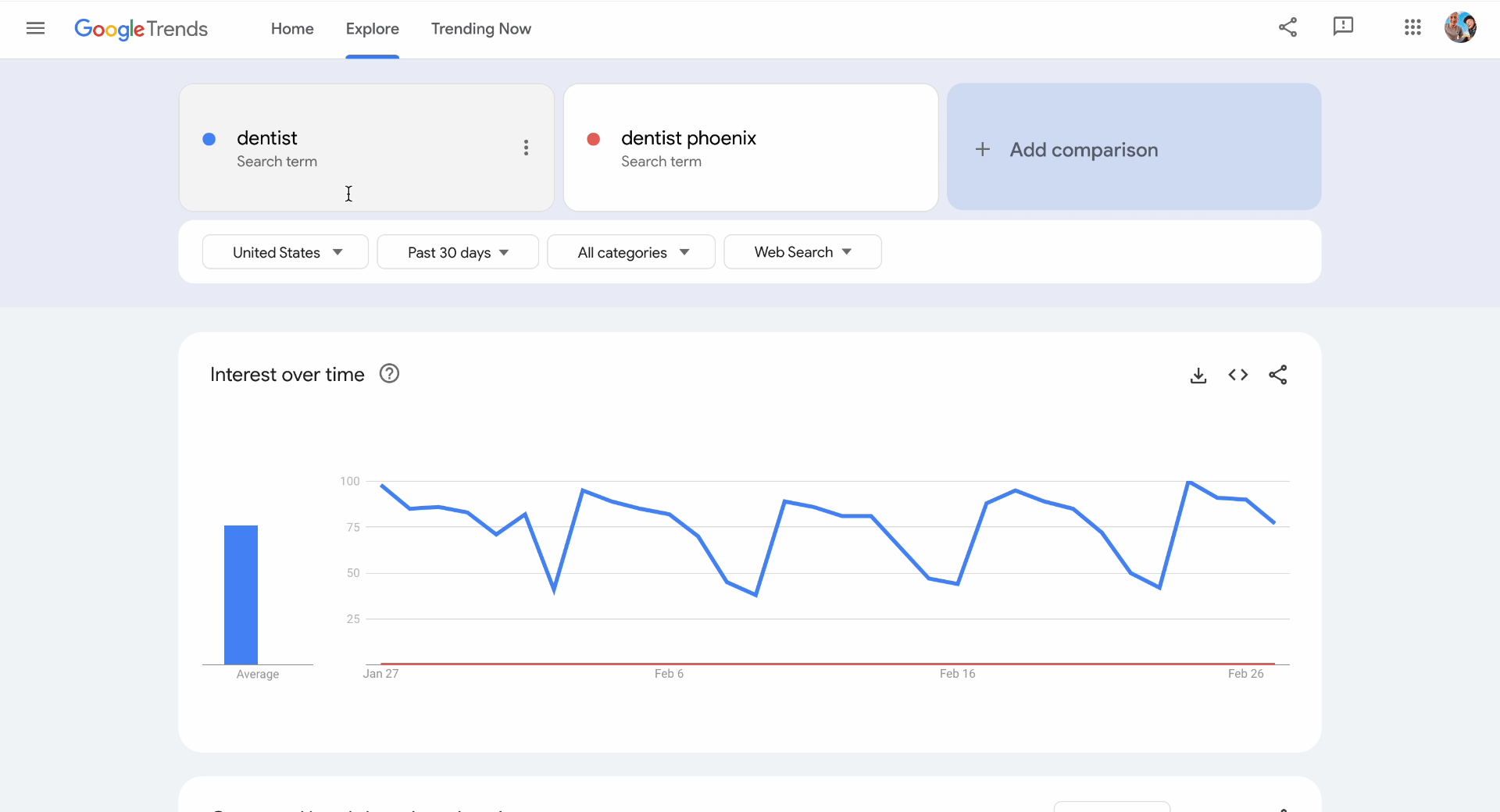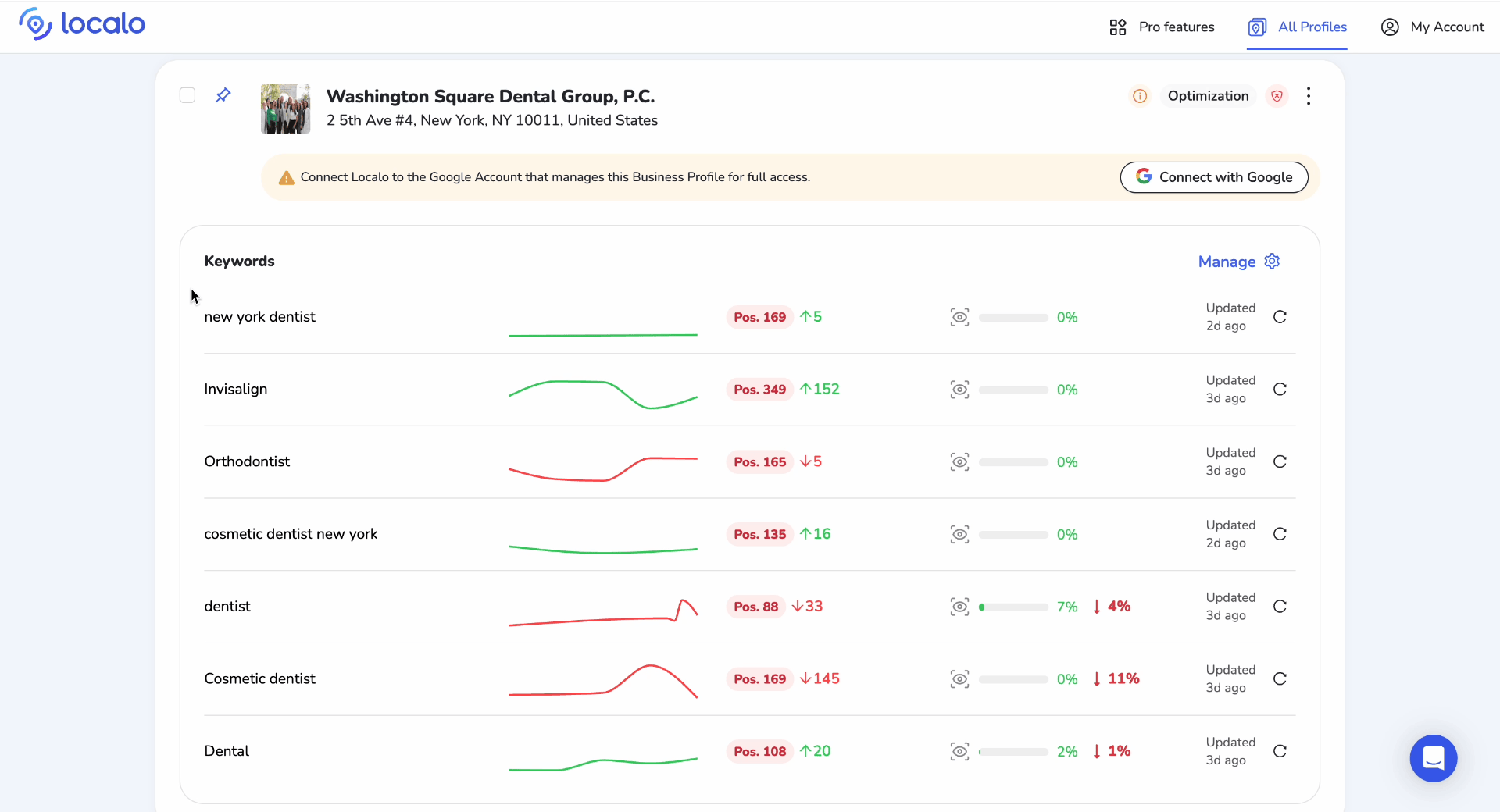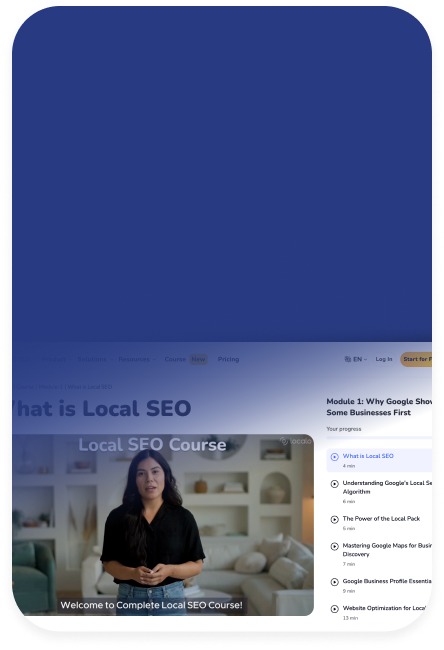In this article, I’ll show you how to conduct local keyword research and choose the ideal phrases to optimize your local business profile. Based on my experience and insights from SEO experts, I’ll share what to look for so you don’t waste time on keywords that won’t deliver real results.
Precisely chosen keywords are the foundation of success—why fight for top rankings with phrases that won’t attract new customers? I keep my writing short and to the point, so you’ll only find valuable, actionable content here.
Let’s get started! Below, I present the methods and tools that will streamline your local keyword research. The competition never sleeps—so let’s begin with the basics.
What Are Local Keywords?
Local keywords are the search phrases entered into Google by people looking for specific products or services in their area or within a defined region.
For example:
- With a city name: phrases like “Dentist New York”
- Indicating proximity: such as “restaurant near me” or “dining nearby”
- With local intent: when your phone’s GPS helps you find nearby businesses, e.g., “cafe”
These keywords give your business visibility right where it operates—exactly where it’s needed most. From my experience (and I’ll tell you this again and again), well-chosen local keywords are the key to success. Remember that.
What to Consider When Choosing Keywords for Local SEO
Here are a few key elements you must keep in mind :
- Search Volume:
Make sure that the keyword you choose is actually being searched by users. Without sufficient search volume, even the best-selected phrase won’t deliver the desired results.
- Searcher Intent:
Consider whether the person entering the keyword is looking for a local business, a specific product, or a service. Also, check if the search results display a Local Pack (the local business pack in the USA)—this often indicates that the keyword has strong local intent.
- Relevance to Your Business Location:
Your keywords should reflect your business’s location. It’s important to use phrases that include your city or region, e.g., “dentist London” or “cosmetic salon Phoenix,” to precisely reach local customers.
- Search Platform:
Think about where your customers are most likely to search for information—is it on Google’s main search or Google Maps? This insight will help you better optimize your local SEO strategy.
Also consider these aspects:
- Who Are Your Customers?
Define the profile of your target audience—whether you’re addressing young parents, busy singles, or pet owners. Clearly identifying your audience will help you select keywords that capture the unique character of your offer.
- What Products or Services Do You Offer?
Clearly define your offer to stand out from the competition. For instance, if you specialize in gluten-free cakes, use phrases like “gluten-free cakes” or “gluten-free bakery.”
- Where Does Your Business Operate?
If you run a restaurant in downtown Chicago, choose terms like “downtown Chicago restaurant” or “restaurant in Chicago” to attract local diners.
- What Will Potential Customers Type in Google?
Put yourself in your customer’s shoes—think about the queries they might enter, such as “best bar in Austin” or “affordable jeweler Phoenix.” These examples help you create precise and effective local keywords.
 |
Even if your Google Business Profile ranks first, that doesn’t guarantee success if you target generic keywords that don’t reflect local intent. The key is to choose words that precisely reach your local audience.
— Sebastian Żarnowski, Co-founder of Localo |
My experience shows that the answers to these questions form the foundation of an effective local SEO strategy. Start there, then build on each element—remember, every detail counts.
Choosing the Ideal Local Keywords in 6 Steps
You now know what to consider when selecting keywords for local SEO. Now it’s time to put theory into practice with a few simple steps.
You can’t perform effective local keyword research without the proper tools. For years, I’ve relied on a proven set of tools that support me at various stages of the analysis. Here are the tools I use:
- Localo
- Ahrefs
- Google Business Profile Insights (formerly known as Google Listing)
- Google Search Console
- Google Trends
- Google Keyword Planner
- Google Search
Each tool serves different purposes at various stages of your analysis. Soon, you’ll see exactly how and why I use each one.
Step 2: Check Which Keywords Your Business Currently Ranks For
If you already have a Google Business Profile (or listing) or use Google Search Console, you can easily check which keywords your profile or website currently ranks for.
In your Google Business Profile:
- Type “My Business” into Google.
- Click on the “Performance” card.
- Scroll down to the “How Customers Found Your Business” section.
This section shows you how users are finding your business and which keywords they’re typing.

In Google Search Console:
- Open Google Search Console.
- Click the “Performance” tab.
- Under the “Queries” section, you’ll see which keywords your website has appeared for.

Tip: If you want to track traffic from your Google Business Profile in Search Console, add a special UTM parameter to your profile link. This helps you analyze which keywords generate the most visits and how they impact your results.
Step 3: Analyze Keyword Search Volumes and Find Similar Keywords
Now that you have a list of potential keywords, it’s time to check their monthly search volumes. The most recommended tool for this is the free Google Keyword Planner.
Simply enter your chosen keyword(s) to get data on their search volume as well as suggestions for similar terms. This enables you to quickly select a set of keywords to target for your local business.

Step 4: Verify Searcher Intent and the Local Pack
This is a very important step that is often overlooked—neglecting it can lead to poor results and lost customers. Not every search query on Google has local intent; in other words, not every keyword will generate a list of local businesses (Local Pack).
 |
When optimizing locally, focus on selecting only those keywords that users actually enter when searching for a local business in a specific area or region.
— Sebastian Żarnowski, Co-founder of Localo |
You can verify whether a keyword has local intent in two ways: manually or using a tool.
Manual Analysis:
- Go to Google.
- Enter the chosen keyword.
- Check the results—if a Local Pack appears, the keyword has local intent. If not, it might be worth choosing another keyword.

Automated Analysis:
- Use the Localo tool.
- Add your Google Business Profile.
- Check which keywords trigger the Local Pack and see their monthly search frequency.

Step 5: Choose Between Generic and Location-Specific Keywords
Now that you have keywords with local intent, you might face a dilemma: should you target generic phrases or add a location modifier? For example: “dentist” versus “dentist Phoenix.”
 |
Locality is key – don’t be misled by high search volumes of generic keywords if they don’t indicate a specific location. It’s better to focus on keywords that precisely define the area, as they hit the very core of the searcher’s intent.
— Sebastian Żarnowski, Co-founder of Localo |
There isn’t a one-size-fits-all answer, but I’ve developed a strategy that almost always works:
- Don’t be misled by high search volumes for generic keywords.
Keywords without a city or region might be popular, but they don’t guarantee local intent—the user might be searching for a dentist anywhere, not in your area.
- Don’t underestimate location-specific keywords, even if they have lower search volumes.
These phrases clearly indicate that the user is looking for services in a specific area, which is far more valuable for your business.
For example:
- “Dentist” might be searched about 158,000 times per month nationwide—but it lacks local context.
- “Dentist Phoenix” is searched about 1,600 times per month and carries full local intent, meaning the user is looking specifically for a dentist in Phoenix.
You can estimate the local potential of a generic keyword by dividing its national search volume by the number of cities in the country. Depending on your city’s size—adjust by multiplying for larger cities or dividing for smaller ones—you can determine an approximate local search volume. This calculation helps you decide whether it’s more beneficial to target a generic keyword or its location-specific variant.
Additional Example and Calculation:
Take a keyword in the cosmetics industry. Suppose the term “cosmetologist” is searched 15,000 times per month nationwide. If the country has about 1,000 cities, that averages 15 searches per city. In contrast, “cosmetologist + [city]” might be searched 150 times per month—indicating significantly higher local potential since it directly targets users in that area.
It’s also important to regularly monitor which keywords your business appears for in your Google Business Profile—as discussed in Step 2: Check Which Keywords Your Business Currently Ranks For . You can also use Google Trends to see which regions are searching for a particular keyword the most.

Are “Near Me” Keywords Still Effective?
In my experience, keywords with the “near me” addition are losing popularity. They used to be frequently entered, but nowadays fewer people include this term in their searches. Why? I’ve noticed that modern users increasingly rely on their devices’ automatic location detection—smartphones and voice assistants now intuitively know where they are. As a result, instead of typing “restaurant near me,” users simply search for “restaurant,” and Google, thanks to geolocation, delivers local results automatically.
My analysis shows that the search volume for “near me” queries has been steadily declining, indicating that their effectiveness in attracting local customers is diminishing. Therefore, although these terms were once crucial, it’s now more beneficial to focus on precise, location-specific keywords that accurately reflect your business’s area.
By now, you should have a solid set of keywords. Now it’s time to add them to a tool that lets you monitor the rankings and visibility of your Google Business Profile and website, as well as track the performance of your optimization efforts.
For monitoring your Google Business Profile’s rankings for specific keywords, I recommend using Local SERP Tracking by Localo.

To monitor your website’s rankings, you can use Google Search Console or choose another trusted tool—you can find a comprehensive list of recommended rank trackers here.
How Many Keywords Should You Target for Your Google Business Profile and Website?
Exercise caution and use common sense here. While a website can have many pages optimized for various keywords, your Google Business Profile is unique—you can’t optimize it for hundreds of completely different keywords.
For your Google Business Profile, I recommend choosing about 10 key phrases that are similar. For example, for a dental practice, you might target:
- “dentist [city]”
- “implants [city]”
- “dental clinic [city]”
- “oral surgeon [city]”
- “teeth whitening [city]”
These are the primary, specific services you want to rank highly for. Of course, your profile might eventually rank for many more keywords—especially if your website (which links to your profile) is well-optimized. A well-optimized website can further boost your business profile’s visibility in search results.
Summary
Effective local keyword research is the foundation for building your business’s online visibility. With tools like Localo, Ahrefs, Google Search Console, Google Trends, and Google Keyword Planner, you can precisely match keywords to your local customers’ intent. Careful analysis of search volume, verification of intent, and the selection of location-specific keywords ensure you reach your local audience—leading to better results in Google Maps and organic search.
Take care of your local keyword strategy and give your business an edge over the competition today!

Article author:
Sebastian Żarnowski
Co-founder & CEO
I have been involved in local marketing for years, starting my career at KS Agency, where I also initiated the Local SEO department. Currently, as a co-founder of Localo, I am developing a tool that helps local businesses reach their customers. I share my knowledge through blogs, webinars, social media, and YouTube videos. I focus on authenticity, a practical approach, and effectiveness to support the growth of local businesses and help them connect with their customers more effectively. I value unconventional thinking and am constantly seeking new solutions in marketing.













